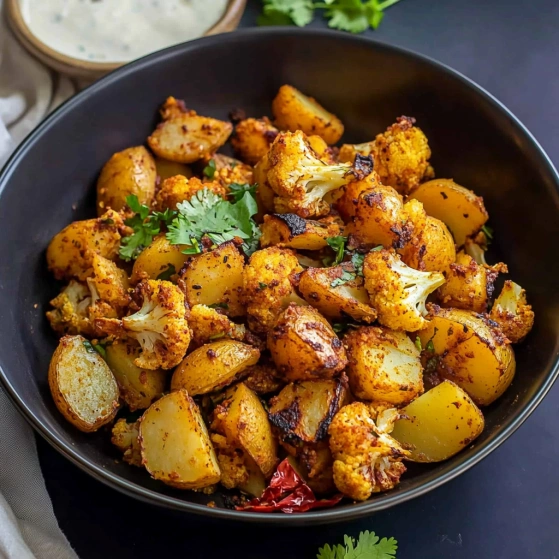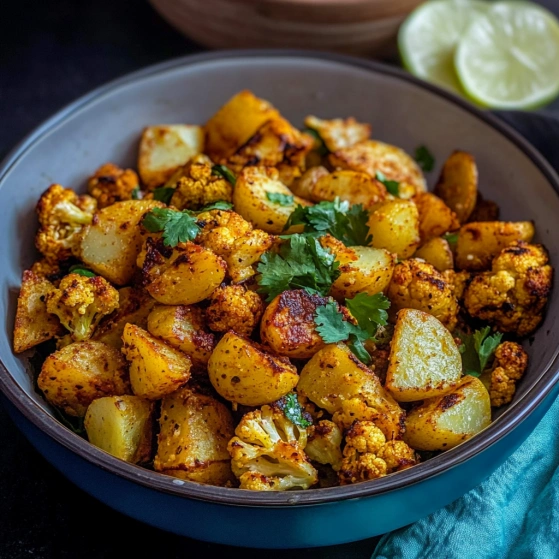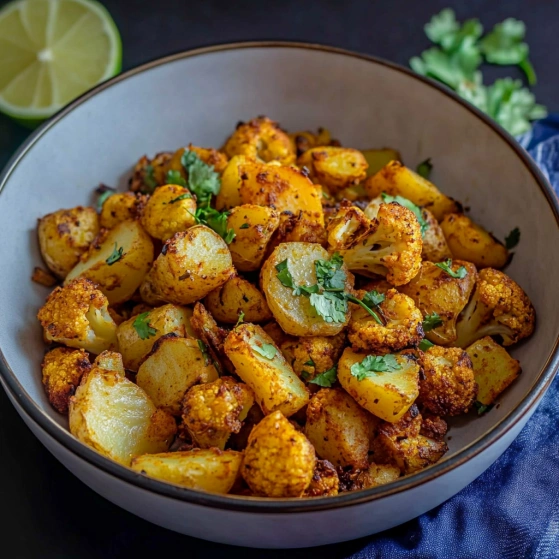 Pin it
Pin it
This air fryer aloo gobi transforms ordinary cauliflower and potatoes into a flavorful Indian side dish with minimal effort. The air fryer creates the perfect texture while the aromatic spices infuse every bite with authentic flavor.
I discovered this recipe when trying to recreate my favorite restaurant dish without the excessive oil. Now it's become our Sunday dinner staple alongside homemade naan bread.
Ingredients
- Cauliflower florets: 200 grams chosen for their ability to absorb flavors
- Potatoes: 250 grams look for starchy varieties like russet or Yukon gold
- Oil: 1 tablespoon helps spices adhere and promotes browning
- Salt: 1 teaspoon balances the spice blend
- Red chili powder: ½ teaspoon adds heat adjust to your preference
- Turmeric powder: ¼ teaspoon provides earthy flavor and vibrant color
- Tandoori masala: ½ teaspoon gives that authentic tandoor flavor
- Garam masala: ½ teaspoon adds warmth and complexity
- Kasoori methi: 1 tablespoon dried fenugreek leaves for distinctive aroma
Step-by-Step Instructions
- Preheat Air Fryer:
- Set your air fryer to 370°F and allow it to preheat for 5 minutes. This ensures even cooking from the start and helps develop that perfect crispy exterior.
- Prepare Vegetables:
- Cut cauliflower into evenly sized florets and potatoes into 1-inch cubes of similar size. Consistency in sizing ensures everything cooks at the same rate, preventing some pieces from burning while others remain undercooked.
- Season The Vegetables:
- Add all the vegetables to a large mixing bowl. Pour in the oil first to help the spices stick, then add salt, red chili powder, turmeric, tandoori masala, and garam masala. Toss thoroughly using your hands to ensure every piece is well coated with the spice mixture.
- First Air Frying:
- Line your air fryer basket with aluminum foil this prevents sticking and makes cleanup easier. Arrange the seasoned vegetables in a single layer allowing some space between pieces for proper air circulation. Cook at 370°F for 14 minutes, pausing halfway to shake the basket for even browning.
- Final Flavoring And Crisping:
- Remove the partially cooked vegetables and transfer them back to your mixing bowl. Sprinkle with crushed kasoori methi leaves and gently toss to distribute. The residual heat activates the aromatic compounds in the dried leaves.
- Final Crisping:
- Return the seasoned vegetables to the air fryer. Increase temperature to 400°F and cook for just 2 more minutes. This final blast of heat creates the perfect texture crispy exterior with tender insides.
 Pin it
Pin it
Kasoori methi might seem like an optional ingredient, but it truly transforms this dish with its distinctive aroma. I once made this recipe without it when I ran out, and while still good, it lacked that authentic restaurant quality that makes everyone ask for seconds.
Spice Level Customization
The beauty of making aloo gobi at home is controlling the heat level. For a mild version suitable for children or those sensitive to spice, reduce the red chili powder to just a pinch. If you enjoy more heat, increase to a full teaspoon or add a finely chopped green chili to the mix. The tandoori masala also contributes to the overall spice profile, so adjust accordingly. Remember that spices bloom and intensify during cooking, so start conservative if unsure.
 Pin it
Pin it
Serving Suggestions
Aloo gobi shines as part of a larger Indian meal. Serve alongside basmati rice and dal for a complete protein-rich meal. For a lower-carb option, pair with cauliflower rice and raita. It makes an excellent side dish for grilled meats or can stand alone as a vegetarian main course. I love serving it with warm roti or naan to scoop up every last bit of flavored goodness. A squeeze of fresh lemon juice and a sprinkle of cilantro just before serving adds brightness to the rich spices.
Traditional vs. Air Fryer Method
Traditional aloo gobi requires significantly more oil and constant attention to prevent burning. The air fryer method reduces oil by nearly 80% while creating the same beloved texture. In conventional cooking, achieving the right balance between tender and crispy often means multiple steps - parboiling potatoes first or cooking ingredients separately. The air fryer simplifies this process dramatically while maintaining authentic flavor profiles. The concentrated heat circulation also intensifies the spice aromas, making this version particularly fragrant.
Frequently Asked Questions
- → Can I make this aloo gobi without an air fryer?
Yes, you can roast the spiced potatoes and cauliflower in a conventional oven at 400°F for about 25-30 minutes, stirring halfway through. You can also prepare it in a skillet on the stovetop with a bit more oil, though the texture will be less crispy.
- → What can I substitute for kasoori methi?
If you don't have kasoori methi (dried fenugreek leaves), you can use a small amount of fresh chopped cilantro as a finishing herb. While the flavor will be different, it still adds freshness. Alternatively, a pinch of ground fenugreek seeds can provide a similar taste, though use sparingly as the seeds are more potent.
- → How do I prevent my cauliflower from becoming mushy in the air fryer?
To prevent mushy cauliflower, ensure your florets are dried completely after washing, cut them into even-sized pieces, don't overcrowd the air fryer basket, and shake the basket halfway through cooking to ensure even air circulation.
- → Can I prep this dish ahead of time?
You can cut and season the vegetables up to a day ahead and store them in an airtight container in the refrigerator. When ready to eat, simply air fry as directed. The final dish is best enjoyed fresh but can be refrigerated for 2-3 days and reheated in the air fryer for 2-3 minutes to restore crispness.
- → What other vegetables work well in this dish?
This spice blend works wonderfully with other vegetables like carrots, bell peppers, green beans, or sweet potatoes. Just adjust cooking times according to the vegetable's density—denser vegetables like carrots will need more time than bell peppers.
- → Is tandoori masala essential for this recipe?
While tandoori masala contributes distinctive flavor, you can substitute with a mix of cumin, coriander, paprika, and a dash of cinnamon if needed. The dish will have a slightly different but still delicious flavor profile.
